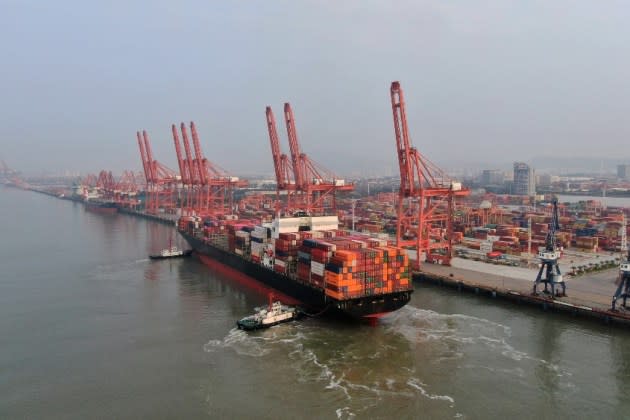House Lawmakers Introduce Bill Targeting China’s Trade Crimes
- Oops!Something went wrong.Please try again later.

A bipartisan group of House lawmakers is hitting back at China-based companies for violating U.S. trade laws through subversive actions like duty evasion and illegal transshipment.
The Select Committee on the CCP, led by Chairman John Moolenaar (R-MI), alongside Congresswoman Ashley Hinson (R-IA) and Ranking Member Raja Krishnamoorthi (D-IL), on Thursday introduced the Protecting American Industry and Labor from International Trade Crimes Act.
More from Sourcing Journal
According to the legislators, the Department of Justice (DOJ) lacks sufficient resources to address the volume of trade crimes stemming from China-based commerce. The law would establish a new structure for halting international trade crimes, providing a framework for detecting, investigating and prosecuting trade fraud, the evasion of duties like the Section 301 tariffs, and transshipment, wherein other countries are used as intermediaries to facilitate the flow of China-made goods.
“Not a week goes by without the Committee learning of yet another American company harmed by Chinese companies shipping their goods through other countries to illegally evade tariffs,” Chairman John Moolenaar said in a statement. “While heightened tariff rates can help level the playing field for U.S. businesses, the legislation we are introducing today adds teeth to the tariffs and punishes companies for breaking the law.”
The Protecting American Industry and Labor from International Trade Crimes Act would establish a task force within the DOJ’s Criminal Division to investigate and prosecute trade crimes, while bolstering countrywide responses to such offenses through federal, state and local law enforcement training to facilitate parallel criminal and civil enforcement.
The bill would require the Attorney General to provide Congress with a yearly report on the DOJ’s efforts, including statistics on trade crimes and the way funds are being allocated. It would earmark $20 million for fiscal 2025 to support the efforts.
Rep. Hinson said China has “blatantly violated U.S. trade laws and ripped off American workers with no accountability or consequences” for decades. “This has led to shuttered factories and devastating job losses across the country, hollowing out American industry and gutting rural manufacturing towns while enabling the CCP’s forced labor practices.”
The Iowa legislator said the bill would help spur a reshoring movement, bringing manufacturing back to the U.S.
“Whether it is dumping below-market iron and steel, flooding the American market with illegal vapes, or violating the Uyghur Forced Labor Prevention Act, we must send an unmistakable message to companies based in the People’s Republic of China that their illegal trade practices must end now,” Ranking Member Krishnamoorthi added.
The America First Policy Institute said China’s trade crimes have facilitated the sale of goods made with forced labor to U.S. consumers.
“Refusing to abide by international law enables the PRC’s non-market economy, authoritarian Communist leadership, and Uyghur forced labor in China’s Xinjiang province while simultaneously undermining U.S. companies and workers, it said. “AFPI supports efforts to prosecute PRC violations of Section 301 and 232 tariffs and abuses under the Uyghur Forced Labor Protection Act.”
The Campaign for Uyghurs also threw its support behind the bill, saying it provides a means of ensuring compliance with laws like the UFLPA beyond the measures already in place.
“The UFLPA has set a strong precedent to prevent the American market from being tainted by forced labor,” the group said. “This legislation goes a step further in holding violators accountable and closing accountability gaps in the current system.”
“No one should turn a blind eye to the ongoing Uyghur genocide and CCP state-sponsored exploitation of Uyghur people for forced labor,” the group added. “Those who continue to undermine the UFLPA and existing trade laws should face appropriate consequences.”
The Coalition for a Prosperous America, which represents U.S. manufacturers, farmers and industry, said its members are being forced to compete with China and other foreign entities that are benefitting from illegal trade activities.
Michael Stumo, CEO of CPA, said DHS earlier this year raided Sunsong North America’s plant in Moraine, Ohio—the U.S. subsidiary of China-based Qingdao Sunsong, an automobile parts manufacturer. The group is currently being investigated for trade fraud, a fact that “underscores the urgent need for the Department of Justice to have enhanced authority and resources to prosecute international trade crimes effectively, thereby protecting American manufacturers and workers from malicious foreign entities intent on displacing them.”
National Council of Textile Organizations president and CEO Kim Glas commended the Committee for pushing the bipartisan bill.
“NCTO has called for additional federal tools and resources to urgently address the pervasive trade crimes impacting our industry as well as other U.S. manufacturing sectors,” she said. “We are pleased that this legislation will do exactly that by establishing a formal structure within the Department of Justice’s Criminal Division dedicated to aggressively prosecute international trade crimes.”
Glas has said the U.S. textile industry has taken a major hit due to the influx of cheap goods from direct-to-consumer e-tailers like Shein and Temu.
“The U.S. textile and apparel supply chain has been severely harmed by rampant trade fraud, including an onslaught of imported products made with forced labor, which circumvent the U.S. ban on these imports, fraudulent rules of origin claims under our free trade agreements, and evasion of duties through abuse of the de minimis trade loophole,” she added.
“This had resulted in the closure of 18 textile plants over the past several months and job losses, combined with closures in Western Hemisphere trade partners who have suffered tens of thousands of job losses.”
“We believe this bipartisan legislation is a critical step forward in confronting such massive fraud and will serve to hold bad actors accountable and help shield our vital domestic industries from these crimes,” Glas said.
The bill’s original co-sponsors include House Republican Conference Chairwoman Elise Stefanik (R-NY), House Appropriations Committee Ranking Member Rosa DeLauro (D-CT), Reps. Darin LaHood (R-IL), Glenn Ivey (D-LA), Nate Moran (R-TX), Ted Lieu (D-CA), Ben Cline (R-VA), Haley Stevens (D-MI), Kevin Kiley (R-CA), Deborah Ross (D-NC), and Lou Correa (D-CA).
